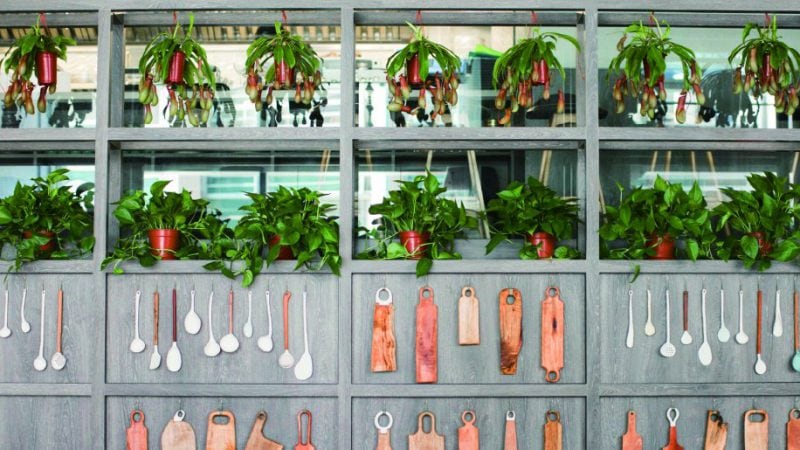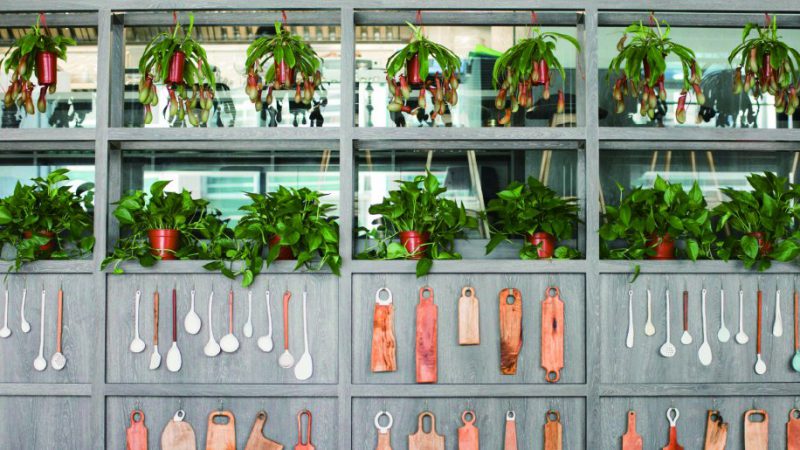Eating Your Greens
February 28, 2019


As diners become ever more concerned about the provenance of their meal, vegetarian restaurants across Asia are mushrooming in popularity and acclaim. From Mumbai to Tokyo and everywhere in between, no longer are vegetarians palmed off with the choice of a limp omelette or swampy risotto.Instead, there are plates just as creative and delicious as those in spots catering to carnivores, while many Michelin-starred chefs, otherwise cooking meat and fish, relish the chance to craft tasting menus for vegetarians.
“When I first moved to Hong Kong, it was certainly possible to find veggie food, but not that plentiful in choice and options. Now it’s much more common and we’re spoiled for choice,” says Isobel McKenzie, a Hong Kong-based editor who is vegetarian. “New places are opening up all the time and more ‘regular’ restaurants are catering to veggie diets too, especially with the rise of Impossible Meats, Omnipork and the Beyond Range.”A number of otherwise carnivorous diners have taken a “flexitarian” approach to vegetarianism, spurred on by initiatives like meat-free Mondays. Some are worried about their carbon footprint and the impact of red meat, especially beef, while others are mindful of wellness.
Culturally, vegetarianism is also widely practiced, bringing with it a seemingly limitless selection of dishes, especially in South Asia. “There has always been a space in Asian cuisine for vegetarians because of Buddhism,” McKenzie says.
An increasing number of celebrities who are also vegetarians or vegans – including Ellen DeGeneres, Paul McCartney, Ariana Grande, Mike Tyson and Liam Hemsworth – have also helped spread the gospel of a plant-based diet.
Whatever someone’s reason for taking the vegetable-based road in life, it’s clear that their restaurant choices, especially in Asia, are only getting better. Here are a few top selections around the region.
Bali
Glow at COMO Shambhala Estate
Amid the verdant tiered rice paddies and jungles of central Bali around Ubud, COMO Shambhala Estate promises a “360-degree approach to wellness.” What that means in practice is having a resident yoga teacher, ayurvedic doctor and dietician who keep you gently on track for activities like hiking, cycling and massage therapies.
Since diet is essential to health, the food at in-house restaurant Glow is obviously key. The four different three-night wellness programs – called “Cleanse,” “Be Active,” “Ayurvedic” and “Bespoke” – have suggested dishes highlighted in Glow’s menu.
Glow seems to float over the treetops, with stunning views below to the river valley, but the nutritionally balanced COMO Shambhala Cuisine also rightly attracts a lot of attention. The salads are a revelation, and their vitamin- and mineral-rich juices made me feel better after just a few sips, but it’s the vegetarian mains which are most memorable. Try sweet and sour beetroots with leeks, radicchio and goat’s cheese, or barley risotto with portobello mushrooms, fern tips, parmesan and parsley.
COMO Shambhala Estate, Banjar Begawan, Desa Melinggih Kelod, Payangan, Gianyar 80571, Bali, Indonesia; tel +62 361 972 448; comohotels.com/en
Hong Kong
Grassroots Pantry
Peggy Chan is chef-owner of Grassroots Pantry, a plant-based Hong Kong restaurant that since 2012 has cemented its reputation in the city. Her passion for her work is underpinned by a commitment to environmental awareness. The ingredients crafted in the Hollywood Road eatery’s kitchens are sustainable, organic, unprocessed and largely locally produced. She and her team are also striving to reduce food waste, cut greenhouse gas emissions and commit to transparency and traceability.
A seven-course tasting menu launched in October 2017 shows the creative execution at work with dishes such as “Not Cheese,” featuring “halloumi” crafted from cashews that is served with molasses and pickled fig jam. The unique taste and mouthfeel of dried shrimp are carefully and painstakingly re-created using toasted and dehydrated shimeji mushrooms, while a butternut squash taco is based on a bell pepper confit and queso fresco made from hemp. À la carte favorites include an excellent macadamia cheese and beetroot agnolotti.
Grassroots Pantry, Shop D, G/F, CentreStage, 108 Hollywood Road, Central, Hong Kong; tel +852 2873 3353; grassrootspantry.com
Hanoi
Uu Dam Chay
Little did I know that dried lotus root with cheese powder was an excellent source of dietary fiber and vitamin B, but the vast menu at the elegant vegan restaurant Uu Dam Chay in Hanoi explains that – and a lot more – across its multiple pages.
Uu Dam is a Sanskrit term meaning “sacred flower descending to Earth from Heaven,” a reference to rare blooms that appear every 3,000 years, according to Buddhist scripture. The relaxed and cool space near the Metropole – a warren of rooms, corners and terraces – takes over three floors of an old house. Quiet and friendly service delivering excellent dishes ensured this carnivore didn’t miss meat – or dairy – for a second.
Those lotus chips were a revelation with their cheesy powder also providing a hit of umami, while the Vietnamese summer spring rolls were super fresh and lifted by a sweet and spiced sauce. If a vegan Mexican taco served in Vietnam sounds like a culinary train wreck, prepare to be very surprised by an authentic mix of textures and tastes on another excellent plate. A plethora of curries, soups and salads are just some of the other dishes on offer.
Dam Chay, 34 Hang Bai Street, Hoan Kiem D istrict, Hanoi 100000, Vietnam; uudamchay.com/en
Singapore
Greendot
The style is fast and casual, but that doesn’t take anything away from the food at Greendot, which launched its meat-free concept back in 2011 from a stall at Temasek Polytechnic. Its aim back then was to make meals without meat convenient, accessible and affordable. Greendot espouses the positive impact on individuals, the community and the environment of a meat-free diet, proudly proclaiming how it “makes it easy for people to take that first step to go meat-free.”
Mushroom rendang celebrates local Malay flavors with lion’s mane mushroom replacing the beef, while hearty homemade laksa features beansprouts, straw mushrooms and “prawns” made from versatile konnyaku, a form of potato starch.
Greendot also delivers vegetarian bento boxes for lunch or dinner based on your choice of rice, mains like braised mushroom and taukwa, along with two types of vegetable and miso soup. All for a reasonable S$7.90 ($5.80).
Greendot, 1002 Tai Seng Ave, #01-2540, Singapore 534409; tel +65 6702 6621; greendot.sg
Bangkok
Na Aroon
Nestled at the end of Sukhumvit Soi 1 and surrounded by the greenery of the Ariyasomvilla Boutique Hotel sits an unexpected, hidden spot which surprises with its almost exclusive vegetarian menu (some seafood features). The 24-room boutique hotel – formerly a villa – dates back to the 1940s and is full of period charm with its traditional teak flooring and gentle blowing fans.
The restaurant, open from breakfast through dinner, doesn’t use MSG or preservatives in its dishes, which include familiar Thai favorites like yellow curries with imitation chicken and bamboo shoots, as well as tofu with cashew nuts and a decent kick of chili.
Elsewhere yum tua ploo (wing beans with crispy shallots and a boiled egg) and mee grob (caramelized crispy rice noodles) are two of their signatures. A vegetarian version of the popular pad thai noodles features more tofu with the sweet lift of tamarind sauce and papaya. For those not wanting Thai food, Na Aroon also offers respectable versions of European dishes such as house-made pasta and soups.
Na Aroon, 65 Sukhumvit Soi 1, Bangkok 10110, Thailand; tel +66 (0)2 253 8800;ariyasom.com/vegetarian-restaurant-bangkok
Tokyo
Daigo
Buddhist vegetarian cuisine in Japan – known as shojin – is a true culinary art and nowhere does it better than two-Michelin-starred Daigo. In business in Minato-ku since 1950, the elegant and calming spot overlooking impeccable gardens prepares a kaiseki menu featuring the finest seasonal vegetables and ingredients, which are sourced every morning from the Japanese capital’s legendary Tsukiji market.
None of the menus are what you’d call good value, but this is Michelin-starred dining in Tokyo: the cheapest is ¥10,000 ($90), or you can splurge ¥19,000 ($172) for the “orchid kaiseki,” getting you a solid 14 dishes.
All are presented with an extraordinary aesthetic, often served on antique porcelain and pottery, while the service is charming and attentive without being obtrusive – for non-Japanese speakers, an English menu is available and some English is spoken.
A parcel made from lotus root, udon noodles with vegetable tempura, and a dish of fried tofu were three of the standout savory dishes; but one of the desserts, a slice of Yubari melon from Hokkaido, was almost life-changing in its brilliance. Sometimes the simplest things truly are the best.
Daigo, 2-3-1 Atago, Minato-ku, Tokyo 105-0002, Japan; tel +81 03 3431 0811; atago-daigo.jp/en
Mumbai
Tuskers at the Sofitel
There’s an elephantine reason why Tuskers at the Sofitel in the Mumbai district of Bandra is so called: It’s “inspired by regal and merciful vegetarians – the elephants.”
Chef Maharaj Jankidas Vaishnav oversees the preparation of rigorously vegetarian Jain cuisine in an independent kitchen. Unsurprisingly, the elephants feature across the décor in photos, artworks and motifs, while the overall feel is decidedly upscale.
There’s an almost endless variety of meat- and fish-free dishes to choose from. Okra stuffed with coconut, tomato and pepper, known as bhindi sambhariya, is a specialty from Marwar in Rajasthan, while mathania mirch ka paneer is fresh paneer cheese dusted in chili and cooked in a tandoor oven.
Papad moogodi ki sabzi is dumplings made with green lentils, served in a gravy made with tamarind and the cane sugar known as jaggery. Desserts are also a standout, including a decadent pancake called malpua that is covered in sugar syrup and a custard-like milk called rabri.
Tuskers, Sofitel Mumbai, C/57, Block G, Bandra Kurla Complex , Bandra East, Mumbai; tel+91 6117 5115; sofitel-mumbai-bkc.com




